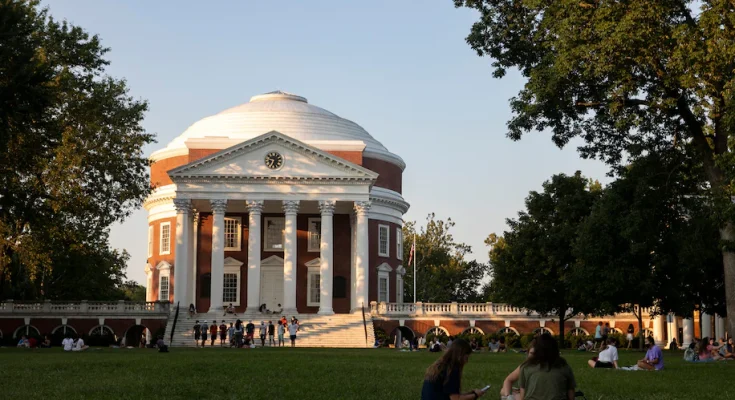The University of Virginia’s governing board voted Friday to dissolve its office of diversity, equity and inclusion, joining other efforts by President Donald Trump and Gov. Glenn Youngkin (R) to remove DEI initiatives in the state and beyond.
“DEI is done at the University of Virginia,” he said in a statement.
It was not immediately clear how many jobs or programs the resolution could affect. U-Va. President Jim Ryan must report to the board within 30 days what any potential restructuring could look like. Ryan did not immediately respond to a request for comment.
“In accordance with the resolution, the administration will review the functions of the office, and all personnel and programs that are permissible under state and federal law will be transferred within the University,” university spokesperson Brian Coy said in a statement. He added the Office for Equal Opportunity and Civil Rights, Title IX compliance and other “important” functions were housed in the DEI office.
The full board did not discuss the resolution in open session before it was approved — Ryan only read aloud the title of it — and the text of the wasn’t immediately available on the board’s website after the meeting ended.
The decision by the U-Va. board come as the Trump administration attempts to excise DEI programs — which he says practice “illegal discrimination” — from the federal government and in schools. A handful of colleges have already done away with those programs amid threats of losing federal funding, even as the Trump administration’s efforts have faced legal challenges. The Department of Education also recently softened guidance telling education institutions, among other things, that the federal government cannot dictate curriculum. It also narrowed the types of DEI programs that might draw scrutiny.
Youngkin has also made targeting DEI initiatives a priority from the beginning of his tenure. His first action when he took office in 2022 was to issue an executive order prohibiting “inherently divisive concepts” in public schools, which led to the Virginia Education Department to rescind a range of diversity and equity programs, policies and memos.
Much of that focus initially had been trained at K-12 schools.
Youngkin appointees make up 13 of 17 seats on the U-Va. board. One of the appointees, Bert Ellis, has repeatedly voiced skepticism of DEI initiatives. In a text message after his appointment, Ellis wrote: “This is going to be a battle royale for the soul of UVA and a microcosm of what must happen across America to save the soul of our country,” The Washington Post reported in 2023. Ellis did not respond to a request for comment Friday.
“U-Va. will pave the way for other colleges and universities to follow,” one of the people said.
The person said that, according to their understanding of the resolution, U-Va. could retain offices for veterans’ preferences, special education accessibility and first-generation recruitment because they are not inherently based on race.
Friday’s vote comes nearly five years after U-Va.’s board endorsed goals in September 2020 to advance racial equity at the university following recommendations from Racial Equity Task Force convened by Ryan that summer. The goals included funding faculty positions, hiring staff to track data on what successful racial equity would look like and expanding on work to connect with descendants of people enslaved by the school.
“I disagree with those who would like to prohibit DEI efforts altogether,” he wrote. “Colleges should continue to promote the core elements of DEI, as these efforts are crucial to ensuring opportunity and access, attracting and retaining the most talented people, creating a vibrant campus culture, and promoting a richer and more robust exchange of ideas.”
But, he wrote, it was important to take criticism of DEI seriously, and that some programs could be improved. Ryan wrote that he was not for mandatory trainings that pushed ideas that are debatable, for risk of the “specter of coercion,” though some trainings and conversations are worthwhile, he said.

